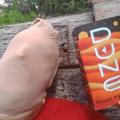Wild Woila reviewed Question 7 by Richard Flanagan (duplicate)
Damn he can write!
5 stars
An exploration of life & death, love & fate, encompassing everything from his family history to HG Wells and the development of the atomic bomb. Damn he can write! The description of his near-death experience is mesmerising. Didn't fully come together for me, but suspect it will benefit from a revisit.
An exploration of life & death, love & fate, encompassing everything from his family history to HG Wells and the development of the atomic bomb. Damn he can write! The description of his near-death experience is mesmerising. Didn't fully come together for me, but suspect it will benefit from a revisit.



